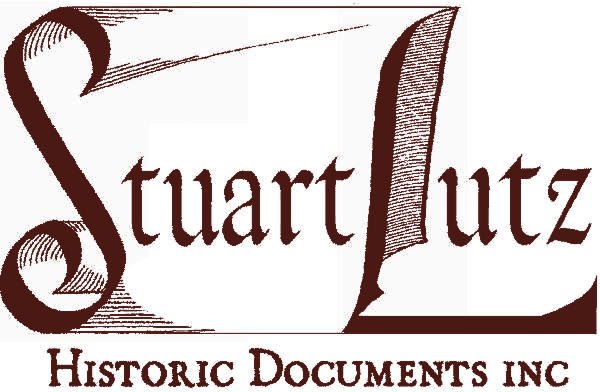| |
 (ANDREW JOHNSON IMPEACHMENT) (ANDREW JOHNSON IMPEACHMENT) |
|
|
|
|
| |
Price: $250.00 |
Stock# 6058 |
| |
GENERAL HENRY S. COMMAGER, CIVIL WAR ERA POLITICIAN AND SOLDIER, CHARACTERIZES PRESIDENT ANDREW JOHNSON AND PREDICTS HIS IMPEACHMENT: “THE PRESIDENT AND CABINET, AND ESPECIALLY THE CABINET, WERE TERRIBLY FRIGHTENED BY THE THREATENING TONE OF THE RADICALS AND BESIDES THESE CONSIDERATIONS, THE WHOLE CABINET ARE AGAINST THE DEMOCRACY”
(ANDREW JOHNSON IMEACHMENT). ALS. 4 pg. 5” x 7”. January 10, 1867. Washington D.C. An autograph letter signed “H.S. Commager” to “Hon W. Carter”: “The day after I reached Washington about Nov 2nd last, I place on file in the Post Office Department an application asking for the appointment of Mr. William Higgins to be Post Master at Defiance. Supposing that there would be no question as to his appointment and having a great many other matters to attend t, I did not trouble the Post Master General about it, for some little time, but finding that appointments were not being made, promptly, I called on the Post Master Genl, specially in regard to the matter, and he then informed me that the President and Cabinet had decided, not to make any more removals, on political grounds alone, until after Congress should meet, and its temper and tone ascertained…The fact is, that, although it took me some time to find it out after coming here, the President and Cabinet, and especially the Cabinet, were terribly frightened by the threatening tone of the Radicals and besides these considerations, the whole Cabinet are against the Democracy. Almost all of them are disposed to get back in some way to the Republican Party. If the President long ago had made a clean and thorough change in his Cabinet, resulting in Democrats he would to-day be master of the situation. Now all depend {sic} on chance...Those who know him best say that he is indeed a strange man; that he can neither be driven nor coaxed to advance one step till he is fully ready; but XX having taken that step forward it is an advance forever…The impeachment idea is dead for this session. But Congress may attempt to reduce the Southern States to Territories. If they pass such an act, the President will not execute it and if the question comes before this Supreme Court, the President will be sustained. Yet the refusal will induce next the Congress to impeach”. This letter by General Henry S. Commager, former Brigadier General of Volunteers and a Democratic Party politician, perfectly sets up the state of political affairs between President Andrew Johnson and the Radical Republican-controlled U.S. Congress. Though both sides had been feuding over Reconstruction since Johnson’s ascension to the presidency, appointment power was also a key divide. The letter describes how Johnson and his Postmaster General Alexander Randall were unwilling to make an appointment for fear of rejection by the U.S. Senate. This fear was codified into law just a month after this letter with the Tenure of Office Act, which would have denied the President the power to remove any executive officer unless the Senate approved the removal during the next full session of Congress, which was unlikely given the existing political dynamics. Johnson’s removal of Secretary of War Edwin Stanton the following year despite the Senate’s rejection of such a removal was the impetus of Johnson’s impeachment, predicted in this letter, and unsuccessful Senate removal trial. Commager died later in 1867, so he did not live to see his prediction come true. The letter is in fine condition with some folds. Included is a separate typed document with additional biographical information and historical context. |
6058
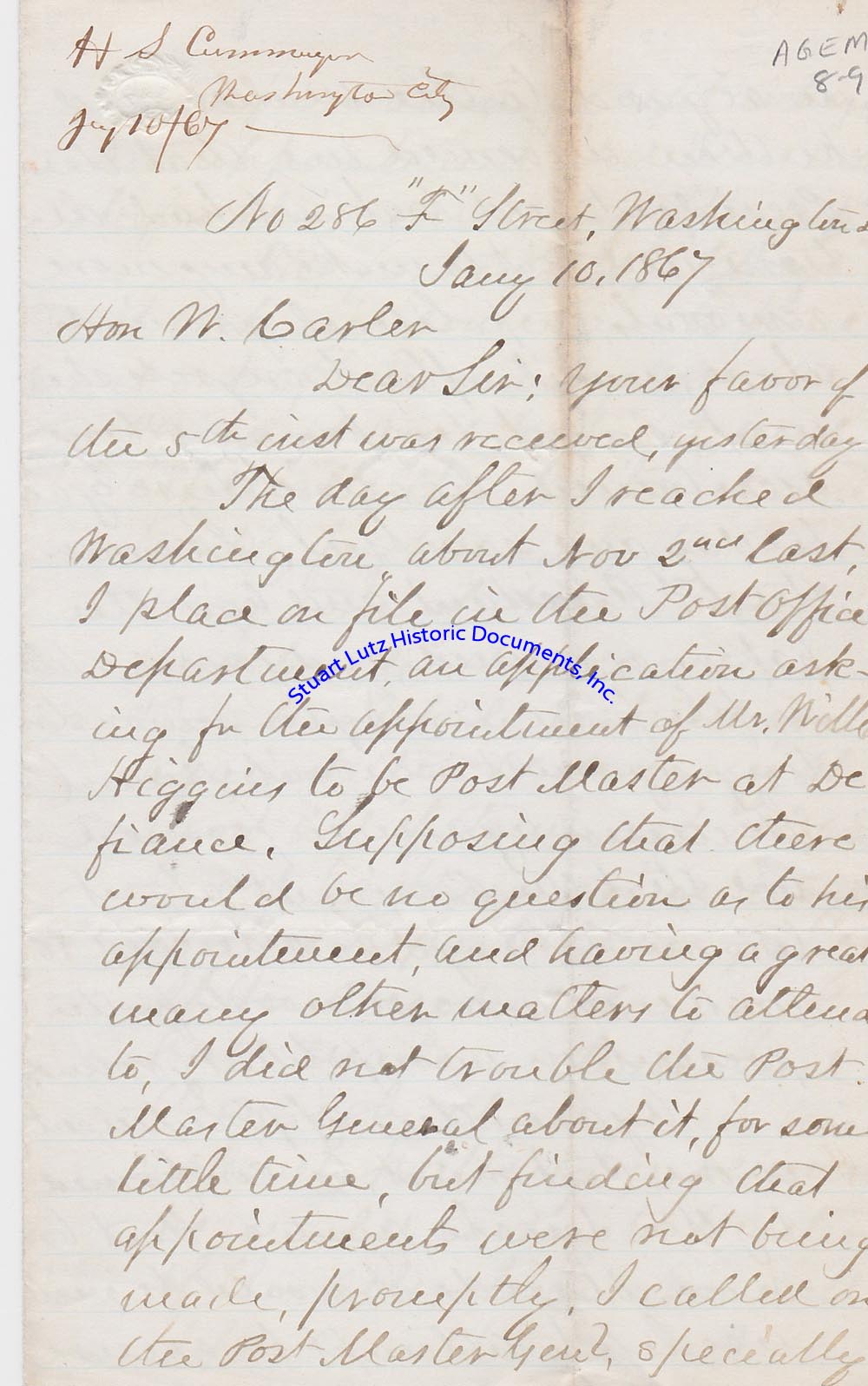
|
|
| |
| |
 (PRESIDENTIAL ELECTION OF 1840) (PRESIDENTIAL ELECTION OF 1840) |
|
|
|
|
| |
Price: $300.00 |
Stock# 5149 |
| |
OHIO AND PENNSYLVANIA POLITICIANS REFLECT ON THE STATE OF PENNSYLVANIA POLITICS JUST AFTER THE 1840 ELECTION OF WILLIAM HENRY HARRISON TO THE PRESIDENCY
(PRESIDENTIAL ELECTION OF 1840). ALS. 2pgs. November 18, 1840. Cincinnati, Ohio. An autograph letter signed “J Burnet” by Ohio lawyer and politician Jacob Burnet (1770-1853). It is addressed to James Dunlap of Pittsburg. Burnet replies to Dunlap’s letter stating his concerns about Pennsylvania politics in light of the recent 1840 Presidential election, in which William Henry Harrison defeated Martin Van Buren. Harrison would die only a month into his Presidency. Mentioning a “schism” at one point, Burnet seems to anticipate the national divide that would eventually lead to the American Civil War, although this may have referred to economic issues rather than the question of slavery: “Dear Sir I have received your letter of the 12th inst and read it with interest. The matter it contains…the view you have taken of the state of parties in Penna are highly interesting, and are certainly entitled to serious consideration. The mixture of parties, of which you speak, as having taken place in the late struggle, can not, as you observe…There is reason to fear, that when the cause which…the union, the fruits of which we have just gathered, shall warn so often at, the repelling principle…will throw the parts from each other, as far as they win, before the conflict began, unless something can be done, to effect such a permanent combination, as you refer to. I confess I now have understood the theory of party…as they have existed in, and have agitated your state, or the principles on which they have been found, or by which they are…I can however easily…schism, may be the result of such an injudicious course on the part of the…you are anxious to prevent. It would give mow me great pleasure to be instrumental in preventing the wit you depict so strikingly, were it in my power. I was known unequal to the task, because I have no claims to the confidence of the General, beyond those of his friends generally, not because in addition to this, I could not point him to the parties, or the persons, as to whom he ought to be on his guard. A frank communication from a confidential friend in Penna, who understands the whole subject, would receive the attention it deserves. An intelligent Penna…can communicate the specific information necessary to show him the danger and the mode of avoiding it. Advice or caution in a care like this, to have its proper influence, should come from the power of information. Your views on the subject of claims, founded on services, rendered in the late political contest, are precisely those I entertain, and express on all occasions, and I have reason to believe, the General looks on the subject though the same medium, and views it in the same light. If our motives have been patriotic, our labor has been done for the country, and success is our only legitimate reward. If they have been personal they are not praiseworthy, and ought not to be rewarded. I am confident that president elect views the matter in that light, and that he does not feel personal obligations to any body, on account of no part taken in the contest. If this be not so, I have very much misunderstood his character. Yours very respectfully J Burnet”. The letter is in very good condition with a loss to the back page that does not affect any content. A reminder of the eternal contention and controversy in American political elections. |
5149
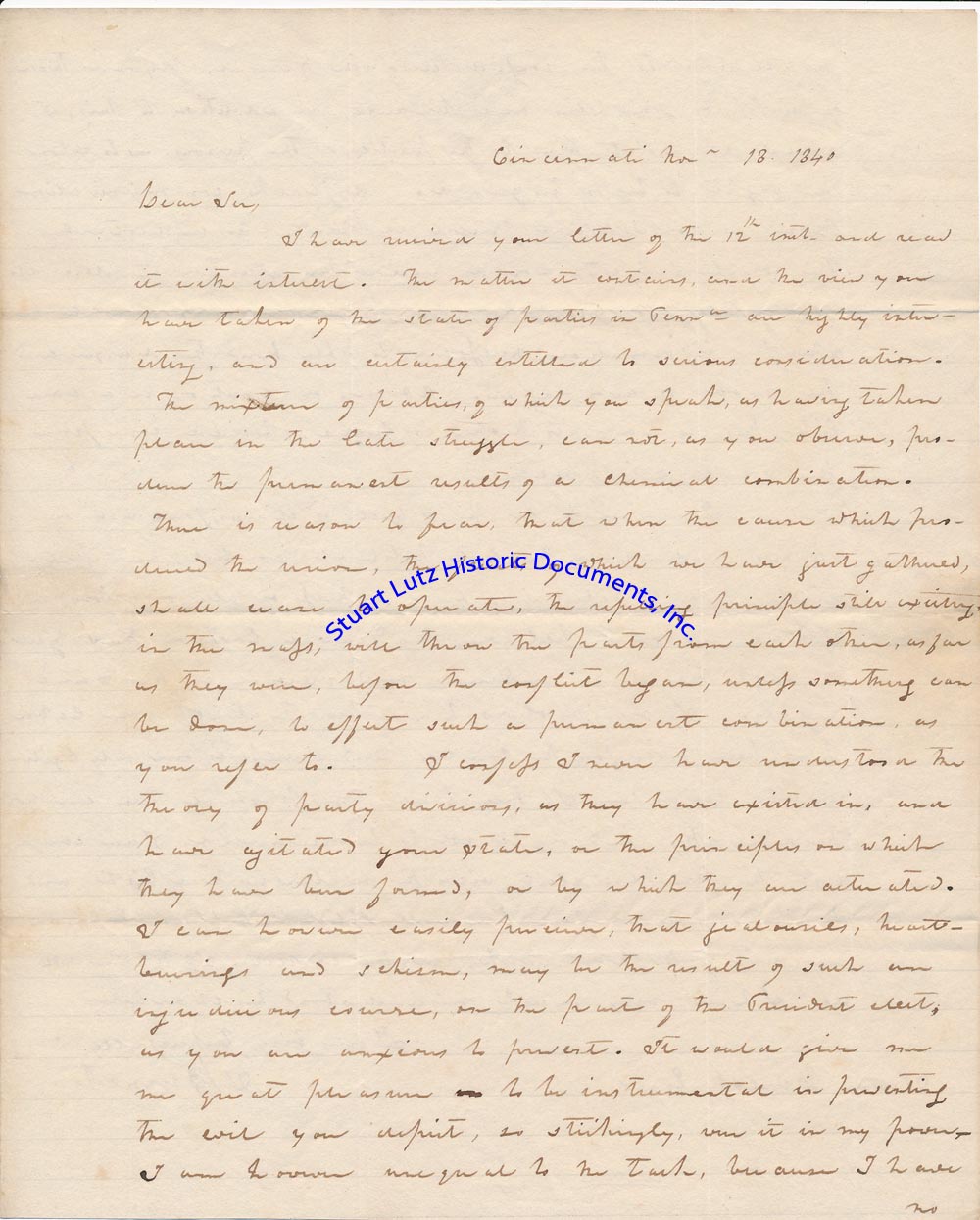
|
|
| |
| |
 JAMES BLAINE JAMES BLAINE |
|
|
|
|
| |
Price: $50.00 |
Stock# 2423 |
| |
Signature. No date. Maine. A signature James Blaine on a small card. |
2423
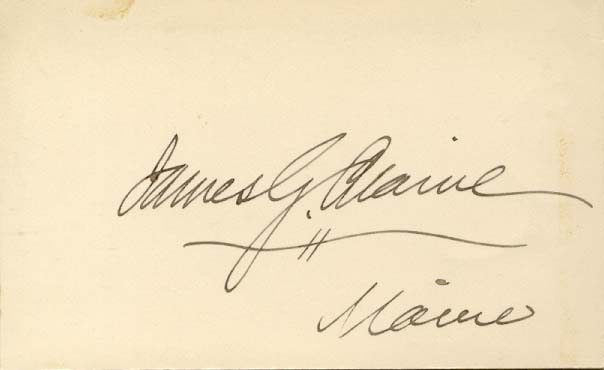
|
|
| |
| |
 JAMES BRIGGS JAMES BRIGGS |
|
|
|
|
| |
Price: $450.00 |
Stock# 5851 |
| |
LETTER FROM INFLUENTIAL CAMPAIGN STRATEGIST URGING SCHUYLER COLFAX TO RUN FOR SPEAKER OF THE HOUSE DURING CIVIL WAR: “CHASE IS HERE WITH THE MONEY SHYLOCKS. HE THINKS THEY WILL MAKE HIM PREST. THEY HAVE NOT AS MUCH INFLUENCE AS A WISE POLITICIAN”
JAMES A. BRIGGS (1811-1889). Briggs was a prominent Nineteenth Century strategist and journalist best known for coining the famous 1840 campaign slogan “Tippecanoe and Tyler Too: and for helping Abraham Lincoln receive the Republican nomination in 1860.
SCHUYLER COLFAX (1823-1885). Colfax served as the Speaker of the House of Representatives between 1863 and 1869, and as the Vice President under President Ulysses S. Grant.
ALS. 2 pg. 8” x 10”. April 27, 1863. New York. An autograph letter written and signed by “James A. Briggs” to “Colfax” discussing major political issues of the day. Briggs details the challengers Colfax may face in the Speaker’s race, principally from the Blair family given their national influence: “Will you please send me if you have the Report of the Com. on the Conduct of the War & the testimony accompanying the same…Are you laying springs for the Speaker’s Chair? You must go to work quietly but surely for the place. It seems to me that you are there to win. At least I can do nothing to precent. Old Marlow will have his lance in the mess somewhere. He will need watching…The Blairs will be busy as I propose Frank will desire the place. But, one of them as P.M. General - & the father the private cabinet of Lincoln, ought to suffice for one family”. Briggs is prepared to aid Colfax in creating a national campaign for the position, but urges caution on the second page: “Chase will need watching” as Treasury Secretary Salmon P. Chase maneuvers to become President. “I would not risk chance with him, and as, at present advised: I do not intend to be a candidate for nomination…Chase is here with the money Shylocks. He thinks they will make him Prest. They have not as much influence as a wise politician”. Colfax would end up winning the race for Speaker, and his more radical politics frustrated Presidents Lincoln and Johnson, though they were instrumental to passing the Thirteenth Amendment abolishing slavery. Thus, this letter is a fascinating insight into a Republican Party divided by ideology and personal grievances in the middle of the Civil War and is in fine condition. The letter is in fine condition overall. |
5851

|
|
| |
| |
 WILLIAM JENNINGS BRYAN WILLIAM JENNINGS BRYAN |
|
|
|
|
| |
Price: $250.00 |
Stock# 6249 |
| |
WILLIAM JENNINGS BRYAN EDITS HIS WHO’S WHO IN AMERICA LISTING
WILLIAM JENNINGS BRYAN (1860-1925). Bryan was the Democratic nominee for President in 1896, 1900, and 1908, and Secretary of State under President Woodrow Wilson.
AMS. 1 pg. 8” x 10”. 1922-1923. N.p. An autographed manuscript signed “W.J. Bryan”. This manuscript is “For WHO’S WHO IN AMERICA (Vol. 12 1922-23)”. Founded in 1898, Who’s Who is a directory of short biographies grouped by different subjects. This includes Who’s Who in America, which, according to its preface, “endeavors to profile the leaders of American society; those men and women who are influencing their nation's development.” In this manuscript, they are soliciting feedback by William Jennings Bryan on his proposed entry into their 1922-1923 volume. They provide a clipping of their entry from two years ago, and asked him to “Please read the sketch with particular care, making necessary alterations or additions…The aim is simply to verify the printed acts, correct typographical errors and other mistakes, if any, and bring the sketch down to date by adding anything of importance that has occurred since the last volume of WHO’S WHO IN AMERICA was issued”. Bryan then handwrites, in pen, his proposed changes. While they are few, and mostly cosmetic, he asks for the inclusion of two new works under the “Author” section: “The Menace of Darwinism and The Bible and its Enemies 1921”. This reflects Bryan’s final act in public life as an anti-evolution activist. In the 1920s, Bryan shifted his focus from politic to religion, becoming the unofficial leader of a movement that sought to prevent public schools from teaching Charles Darwin's theory of evolution. This would culminate with his participation in the Scopes Monkey Trial in 1925 as the counsel of the prosecution. Though Bryan won the case, he was humiliated by defense counsel Clearance Darrow in the courtroom and in the media for his views, and he died just a few weeks later. The manuscript is in fine condition with folds. |
6249
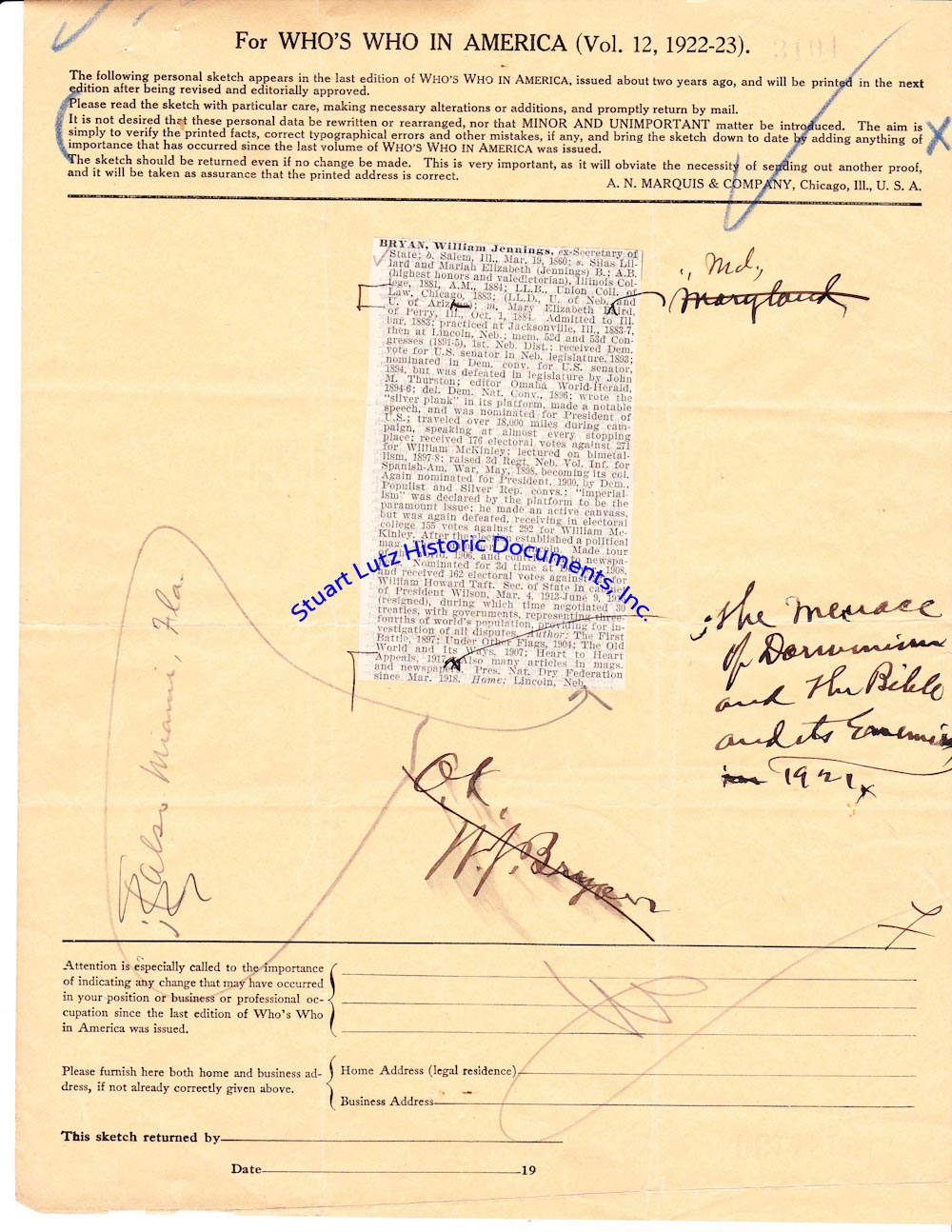
|
|
| |
| |
 HARRY BYRD HARRY BYRD |
|
|
|
|
| |
Price: $25.00 |
Stock# 2388 |
| |
SENATOR BYRD ANSWERS A CONSTITUENT
HARRY FLOOD BYRD. Byrd was a Senator from Virginia.
TLS. 1pg. June 20, 1963. Washington, DC. A typed letter signed Harry F. Byrd to Francis F. Fisher of the Ministers and Missionaries Benefit Board of the American Baptist Convention regarding the passage of a measure that must first pass the House of Representatives: I appreciate your courtesy in letting me have the benefit of your views on this measure. In the event this bill or similar legislation passes the House of Representatives and is referred to the Senate Committee on Finance, you may be assured it will receive our most careful consideration. Typed on Byrds senatorial letterhead as Chairman of the Committee on Finance, the letter is in fine condition. |
2388
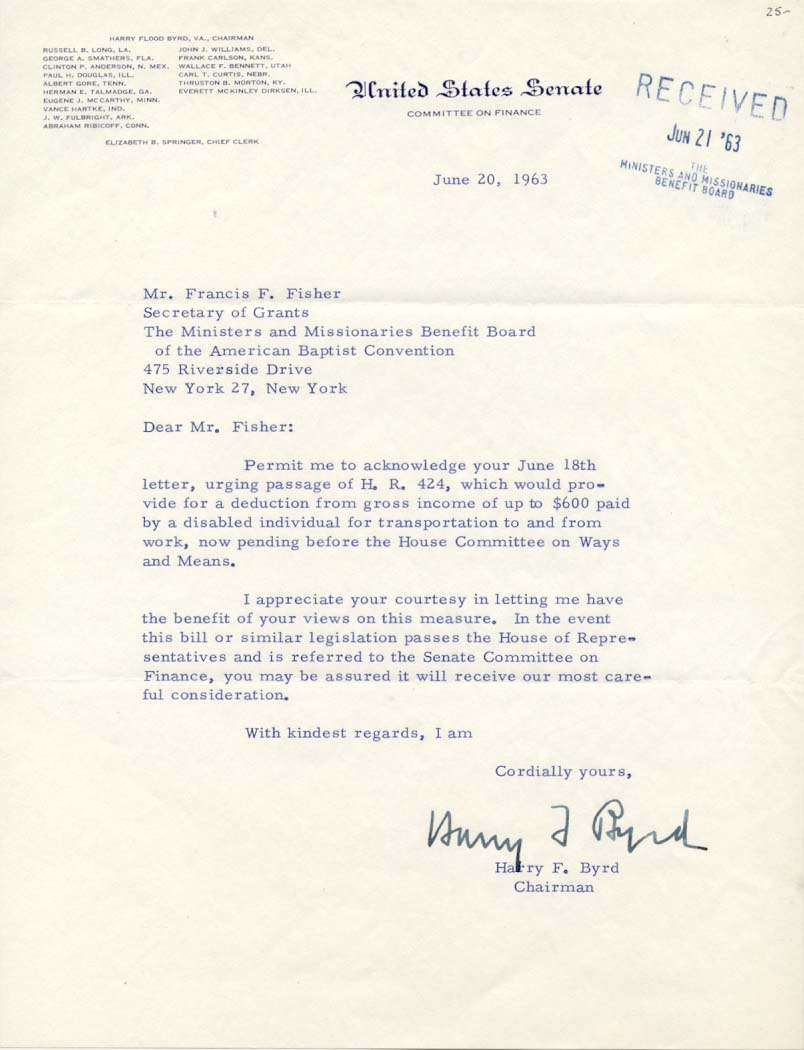
|
|
| |
| |
<Next 6>
|
 |
